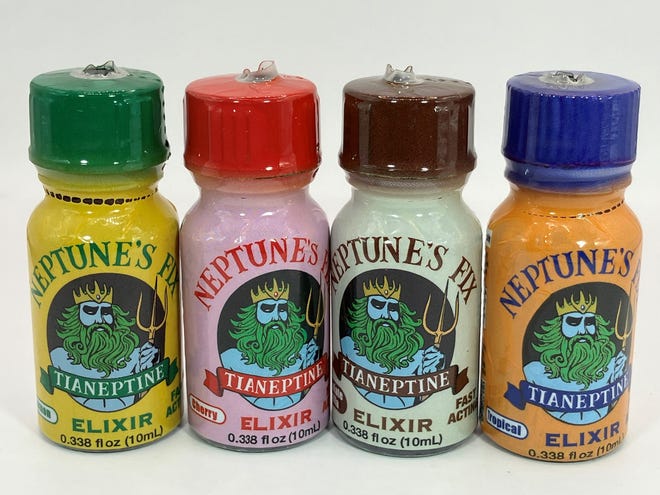NC considers regulating ‘gas station heroin’ as FDA warns consumers about dangers
 Sarah Gleason
Sarah Gleason
A euphoric, heroin-like drug that’s readily available at convenience stores across North Carolina is under scrutiny from state lawmakers.
Nicknamed “gas station heroin,” the product, which includes the drug tianeptine, is also known as Zaza, Tianna, Pegasus, Neptune’s Fix and Tia. It can be easily found online and at gas stations and vape shops without showing any ID or prescription. There is no age limit, meaning even someone under 18 could buy it.
“It’s the equivalent of selling heroin in a convenience store,” said Rep. Stephen Ross, (R-Alamance). “I mean how long are you gonna let that go on?”
Ross, who serves as chairman of the N.C. House Select Committee on Substance Abuse, is pushing for the drug to be classified and regulated as a narcotic under House Bill 563.
During a recent meeting, the committee noted that tianeptine has a high possibility for abuse and cited other states already regulating it as evidence to take swift action. As of early March, 13 states had regulated the drug.
Making tianeptine a schedule 1 drug would effectively ban it from North Carolina stores and from purchase online, Ross said. He hopes to make this change during the General Assembly’s short session beginning in late April.
More:Lawmakers call for FDA overhaul on 'gas station heroin'
In other countries, tianeptine is approved for use in treating depression, but in the United States the FDA has not approved it for any use. In fact, the FDA issued a warning that it has potential for abuse and can lead to severe health concerns. It has cited seizure and loss of consciousness as reasons for the public to avoid it.
Other side effects, according to the FDA, could include agitation, rapid heartbeat, confusion, drowsiness, nausea, vomiting, slowed breathing, coma, high blood pressure and death.
There’s been an increase in the detection and use of tianeptine in recent years as shown in a study the CDC published. Between 2000 and 2013, the National Poison Data System reported 11 tianeptine exposure calls. They received more calls between 2014 and 2017 with the total reaching 207.
Ross said he is almost 100% confident the bill could pass.
Kenny House, a licensed clinical addiction specialist and clinical liaison at Coastal Horizons treatment center in Wilmington, said providers around the state are seeing users attempt to taper themselves off opioids, like Fentanyl, with tianeptine.
This approach is not backed by providers and poses risk for relapse, he said. Instead, House said, the best course of action for getting off Fentanyl, or other opioids, is medication assisted treatment.
“The majority of people who are going to be dependent on opioids, are going to do best to get a combination of medications like buprenorphine or methadone along with some behavioral support,” House said.
The tianeptine products, which can come in powder, pill or liquid form are marketed as a dietary supplement that can help with anxiety, depression and opioid dependence. A bottle can cost between $30 and $40.
Despite the enticing colorful packaging many of the bottles have, Nabarun Dasgupta, senior scientist at University of North Carolina who studies drugs and infectious diseases, said he is not particularly concerned about kids' access to it.
The “price point is higher than you’d expect for kids to be able to afford on a regular basis," Dasgupta said.
Tianeptine’s appearance on the shelves of vape shops and gas station stores could be due to the poor regulation of dietary supplements and vitamins in the United States, Dasgupta said, adding that the future of tianeptine’s prevalence is unknown.
“Given how often we see new things, most of them don’t stick,” Dasgupta said. “It might not stick. It's kind of at a tipping point.”
Meanwhile, House said it's good that the legislature is getting ahead of tianeptine before it becomes a crisis. But he hopes that access to treatment is taken into account when implementing regulatory legislation.
“Making something illegal doesn’t reduce addiction,” House said. “Making something illegal reduces access to that particular substance, which is good, but then on the other hand we also want to continue to work to destigmatize addiction and addictive medicine and to promote treatment access and treatment opportunities for people. Those things go hand in hand.”
More:'Gas station heroin' recalled over tianeptine: Supplement sent multiple people to hospital
In response to the threat tianeptine poses, the FDA has taken action to protect consumers.
“We have issued warning letters to companies illegally marketing tianeptine products as dietary supplements and unapproved drugs,” according to the FDA website. “We also have issued import alerts to help stop tianeptine shipments at our borders.”
Per FDA recommendations, if you need help treating anxiety, depression or substance abuse contact a medical provider.
To find a provider who specializes in substance use disorders look here: www.findtreatment.gov or 1-800-662-HELP (4357).